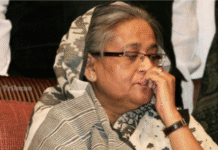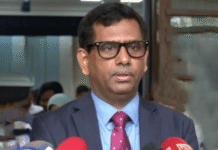She tells tribunal that son admitted involvement in August 21 grenade attack as three CID officials gave them money to save masterminds
More than nine years after being victimised by the state security agencies, Joj Mia’s family yesterday for the first time revealed before a court how the then police administration had attempted to implicate the petty criminal in a cooked up story centring the chilling August 21 grenade attack to cover the real culprits.
Police had arrested a very ordinary poor Jamal Ahmed, also known as Joj Mia, in 2005 and claimed with accomplishment that he was one of the masterminds behind the attack.
It was carried out with an aim to assassinate then opposition leader and Awami League President Sheikh Hasina during a rally on Bangabandhu Avenue. Hasina narrowly escaped death but had an ear injury. At least 23 people died while over 300 injured in the attack.
In several months after the much-talked-about arrest, media first discovered that it was not any ground-breaking revelation by the law enforcers, rather an attempt to victimise a wrong person to hide the real perpetrators.
Joj Mia’s mother Jobeda Khatun gave deposition before judge Shahed Nuruddin of the Speedy Trial Tribunal 1 as the 102nd prosecution witness yesterday. The court fixed tomorrow for her cross-examination.
The 70-year-old lady described the whole episode of police’s staging a drama – how it began and ended.
She said they were astonished when the police had offered them money.
The mother said she had no idea why the police had wanted to give her money to meet the family needs even though they took her son behind the bars. She also could not understand how Joj Mia suddenly appeared as a much-talked-about character in connection with the August 21 grenade attack.
“Son, if the police catch anybody, the family members have to pay the law enforcers to bring the arrestee out of trouble. But why the police will give us money?” Jobeda had asked Joj Mia during her first visit to Kashimpur Jail in 2005.
He also did not understand the reason, and said: “They also offered me money. If they offer you, just take it. I need to save you and myself too.”
Jobeda said then officials of the Criminal Investigation Department (CID) used to give her Tk2,000 as “remuneration” to run the family in Noakhali but stopped after the matter had been disclosed in the media after six months.
She said the officials had assured her of better livelihood as they would send Joj Mia abroad if he had given statement in the August 21 cases admitting involvement in the attack.
“There will be no problem. I will be sent abroad if other accused [in the case] try to do any harm to me. They will bear the expenditure of our family,” Joj Mia had told his mother as he too was assured by the CID officials.
Joj Mia was arrested in 2005 from a remote village in Noakhali but the law enforcers claimed that they had arrested him on June 10, 2005 from a slum at Mohakhali in the capital.
The media at that time also ran reports on the fabricated stories planned by the CID investigators.
After the Awami League assumed power, the law enforcers arrested then CID’s special superintendent Ruhul Amin and assistant police superintendents Atiqur Rahman and Abdur Rashid, among other police officers, for diverting the facts and for staging drama centring Joj Mia.
In her deposition, Jobeda yesterday named the three CID officials.
Her daughter Morsheda and Joj Mia – both prosecution witnesses in the case – came to the court yesterday but they they were not produced at the courtroom. Everyone since morning knew that Joj Mia would not come.
But as the trial proceedings ended around 4:15pm and Jobeda and her daughter came out, photojournalists took snaps. At that time, Joj Mia told journalists that he wanted to speak to media. As it created curiosity among the reporters and photojournalists present at the spot, police hurriedly took them to their vehicle and left the place.
Jobeda earlier told the court how Joj Mia had been arrested after returning home from Dhaka and the ordeals she and her family members had suffered due to systematic repression.
The local Senbagh police arrested Joj Mia on his way to a medicine store at Kartirhat Bazar in the Bengali month of Bhadra. The arrest was made in response to a warrant, the police told her, issued for his connection in a smuggling incident.
Later, a CID team brought him to their headquarters in the capital’s Malibagh.
Jobeda said she along with her daughter and niece managed to meet Joj Mia in Kashimpur Jail in response to a “court order.” She had to pay a lawyer Tk3,000 to get the order.
While talking to Joj Mia at the jail gate, he told her that they would not face any problem rather his family would be given Tk2,000 as monthly payment to meet the expenses.
“Ruhul Amin and Rashid shaheb assured Joj that if he follows their [CID officials] instructions then he will not face any problem…moreover, they will pay us money,” Jobeda told the court.
Jobeda also said she had later met Ruhul Amin and others at their office when she too was assured of the money. Ruhul Amin also gave his mobile number and asked her to call him for the monthly payment.
“We took Tk12,500 in six months with additional Tk500 in the last month…after that, they stopped paying us money,” she said.
“When I approached the officials after six months, they told me that my daughter Khorsheda disclosed to the media everything about our family and my son’s arrest.”
Later, she had to sell her land and properties to meet the family needs and spend for her son’s case.
“During a visit to my son at the jail gate later, he asked me to meet another CID officer named Fazlul Karim,” Jobeda said. “By the grace of Allah my son was later released.”
Joj Mia was released in 2009 following a High Court order.
Joj Mia’s ‘confessions’
On June 26, 2005, Joj Mia made a confessional statement before a magistrate alleging that underworld gang Seven-Star Group, led by one of the most wanted criminals Subrata Bain Shuvro, had carried out the grenade attack.
In line with the instructions he had been given by the CID officials, Joj Mia admitted that he was one of the attackers. All the 14 members of the group met at one Robin’s house at Moghbazar several days before the attack to make plans.
The CID officials engaged the state machinery to cook up the story on instructions from Lutfozzaman Babar, then state minister for home affairs.
The situation changed only after the end of the BNP-Jamaat government.
Further investigation in the two cases filed over the grenade attack revelled that it was not the task of petty criminal Joj Mia and the Seven Star Group.
Finally, it has been found that the attack was perpetrated in collaboration among banned militant outfit Huji, influential leaders of then ruling BNP-Jamaat government and the Home Ministry, and a band of senior officials in different government agencies including police, the Directorate General of Forces Intelligence (DGFI), the National Security Intelligence (NSI) and the Prime Minister’s Office (PMO).
Source: Bd news24










